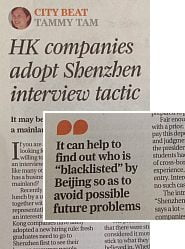Are people in danger of freaking out too much about too little?
To take an example: Greenpeace in Hong Kong have a track record of hyped-up scare tactics. In one publicity stunt years back, their activists emerged from a supermarket in full hazmat spacesuits holding a pack of cookies with tongs. The cookies were made with genetically modified soybean – as is half the stuff on the shelves that you’ve been eating for years. Such theatrics can reduce credibility. The NGO’s recent finding of 2-6 nanograms per litre of PFCs in local reservoirs attracted only brief attention and created zero panic. The problem is that if Greenpeace ever discover a genuine imminent danger to public health, no-one will listen.
Which brings us to two supposed present threats to Hong Kong’s freedoms: copyright amendment legislation, and the stationing of Chinese border-control facilities within the city.
The ‘Internet Article 23’ copyright amendment sounds like it’s being pushed by the Chinese Communist Party, but the main driving force is the US and its entertainment industry. The intention is not to silence anti-government voices but to protect Hollywood’s profits; that said, the law could in theory be used selectively for political reasons. Moderate pro-democrats, mostly lawyers who are respectful of both copyright and the US, are in an awkward position but have pushed for ‘fair use’ safeguards (thus ‘singing a celebrity’s song seriously with no hilarious or news critique purposes and uploading it to YouTube may be illegal’). Radicals, on the other hand, spy an opportunity for a filibuster as an end in itself.
Around 10 years ago, everyone had to start filling in forms and keeping count of how often they photocopied extracts from books and newspapers. Within weeks, the obsessive compliance silliness came to an end (maybe they still do it in universities), but no-one told  the Intellectual Property lobby, and that was the end of that. This looks similar, especially in terms of enforceability.
the Intellectual Property lobby, and that was the end of that. This looks similar, especially in terms of enforceability.
A real threat to Hong Kong would be any sort of move towards Mainland-style Internet-filtering. This copyright amendment may be worth opposing for whatever anarcho-libertarian or anti-Mouse reasons, but portraying it as the Big Internet Clampdown is misleading.
Similarly, the location of Mainland immigration on the Hong Kong side of the border (at the high-speed rail terminus) is not in and of itself worth too much mouth-frothing. I’ve been through US immigration while departing airports in Montreal, Nassau and Bermuda, and anyone on the Eurostar to Paris goes through French immigration at the station in London. It just makes sense in terms of positioning the facilities.
This doesn’t mean the high-speed rail is a worthwhile project; it remains a humungous waste of public funds. Nor does it mean that Justice Secretary Rimsky Yuen should be believed the other 99% of the time. There is probably a nuanced thin-end-of-wedge argument against the border-control plan; Beijing would no doubt relish the symbolism of it (which seems to be the whole point of the rail link). And anything that complicates the white-elephant monstrosity can’t be all bad. But to claim that this specific proposal means jack-booted militia patrolling the streets is misleading.
In both cases, it’s about proportion and priorities and not getting distracted or blinded by the obvious untrustworthiness of the government. The more you freak out about these sideshows – copyright and immigration minutiae – the less capacity you will have to alarm and alert people when a genuinely/more-serious menace to Hong Kong’s freedom comes along. And you can be sure it will. Meanwhile, here’s Tammy Tam panicking that a particular method of blacklisting job-applicants for insufficient loyalty to the Communists might backfire.


Greenpeace, like similar charities, relies on a never-ending stream of donations to keep their outfit going. So every now and then they have to “make headlines” to let their benefactors know that they are still alive and relevant. When they send a boatload of unattractive wimmin and cardigan hippies to the Arctic to protest against baby seals, somebody has to foot the bill. In Hong Kong we have something called ‘Vision First’. It sounds like an optical shop but they too are a ‘charity’, supporting ‘refugees’ from Pakistan and such. Like you, I can’t think of a better way to spend my money. But what you are really paying for is the office rent, the salary and the mortgage of the guy who runs this little scam (I think his name is Cosmo Beatson). So keep giving.
We need genetically-modified taxi drivers.
CY Leung makes me alarmist and I can only hope that we get to hear “for the sake of my family” speech early 2017 – they all seem barking anyway. So the Pro-Dem’s are right to be vigilant. However scrapping amongst themselves and further splintering is only going to cause the loss of the legislative veto and the inevitable nightmare of Prefect Carrie’s democracy masterpiece being dusted off. On the face of it joint border crossings and internet copyright tweaks seem harmless but then so did the MPF and Raphael Hui.
Why cannot (joint ) immigration facilities be at the mainland end?
In part am sure will influence liability etc. Thus if there is an accident/incident on the train while still in HK but after passengers have gone though mainland immigration in HK then mainland will claim jurisdiction. Am sometimes jaundiced about HK courts but much better than mainland.
Like all right-minded people, I’m also against baby seals.
Here is a story for those who like irony. You see all these spam posters everywhere advertising some sort of HK Intellectual Property exchange? I know a guy who pitched the idea to the HK Gov/TDC who promptly turned him down only to copy the idea and launch their own platform.
@dimuendo: Because there is only one station in HK. Makes sense that everybody goes through Chinese and HK immigration in Kowloon instead of building border facilities at every stop on the Chinese side.
The very fact you need to pass immigration gives the lie to the whole “one country, two systems” nonsense.
Hemmers points out he’s “been through US immigration while departing airports in Montreal, Nassau and Bermuda”. But has he ever been through US immigration while flying from one US city to another in the US? I’m guessing not.
De facto, it is “two countries, one system” and the “one system” bit is looking rather more shaky as this rather different reality dawns on more and more people.
The Tammy Tam article truly is sickening: it’s like she believes the fact that black-listing of people from gainful employment turning folk against the government is a mere wrinkle in an otherwise-perfect system. No Tammy! Bad shill! It’s the entire nature of the system! If you black-list people based on their political views, you’re already way past the point of caring about back-lash and into dictatorship-territory.
It is true that you can go through American immigration in overseas airports, French immigration in St Pancras station, etc. Similarly there would be no problem if people going to China went through Chinese Immigration in Kowloon. The only power which the Chinese officials would then exercise would be the right to prevent people from getting on the train. The problem arises with people coming in the other direction. Once they cross the boundary they are in Hong Kong. What then happens if the Chinese Immigration people decide that they should not be allowed to leave China? Are said Chinese officials allowed to arrest the would-be migrant and force him back onto a train — with a special custodial carriage for this purpose, perhaps? The right to board a cross-border train is a small thing. The right not to be bundled off to a territory where you can be tortured, detained without trial or tried without basic protections, is another matter. Do we want to have that happening in Hong Kong? This is surely not a trivial question